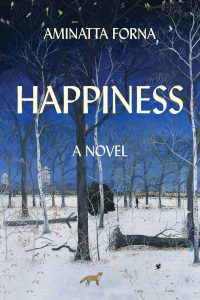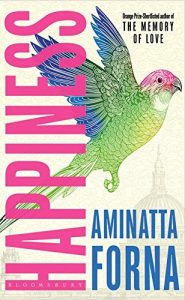 Published by Atlantic Monthly US March 2018
Published by Atlantic Monthly US March 2018
Bloomsbury UK April 2018
Reviewed by Elsbeth Lindner
Stealthily – like the foxes, coyotes and wolves under discussion in Happiness – Forna’s new work creeps up on the reader, its direction initially undetectable. The book opens with an account of wolf-hunting in New England in 1834. Is it an historical novel, an American one?
The answers are no and no, or maybe. For this is a story of wide and significant scope that spans continents and decades, even though it unspools itself mainly in the UK in the twenty-first century. And there’s more to it than mammals or birds, or wildlife or gardens. This is also a book about war and trauma, about refugees and immigrants, survival and the unexpected by-products of suffering. And last, but far from least, it’s a love story.
That this accomplished author can not only juggle all these elements but render them translucent,  readable and fascinating is remarkable, but less surprising if we recall that her previous novels have revealed a similar ability to peel away layers of meaning and perspective. Yet Happiness is exceptionally diverse in content and structure. Even the commentary on the subject of its title comes late and theoretical. The proof is perhaps not so much on the page as in the book’s lingering after-effect.
readable and fascinating is remarkable, but less surprising if we recall that her previous novels have revealed a similar ability to peel away layers of meaning and perspective. Yet Happiness is exceptionally diverse in content and structure. Even the commentary on the subject of its title comes late and theoretical. The proof is perhaps not so much on the page as in the book’s lingering after-effect.
At the novel’s heart are two properly grown-up characters, urban wildlife biologist Jean Tulane, from the USA, and Dr Attila Ansare, a trauma-specializing psychiatrist from West Africa. Separately, they are both fascinated by what they do; professional immersion has resulted in their lives and their occupations having, over time, melded into a single unit. A collision on Waterloo Bridge is the couple’s first introduction, and soon they are involved in the hunt for a lost boy which leads to an expanding network of bonds. Meanwhile Jean becomes drawn into a metropolitan fox-culling controversy and Attila comes to the aid of a lover from earlier days, now an Alzheimer sufferer.
Forna slips episodes from the past into her present-day narrative, showing Jean and Attila at work, and at home too, explaining how they have arrived at this moment. Meanwhile around them, in London, they assemble a curious crew of incomers and marginal folk, a population that fills and lends ballast to an odd, often touching story blending pain, change and death with hope, value and the possibility of love.
Hard both to characterize and put down, this is a fresh and engrossing work, written with enormous heart and attention to detail . Once again, Forna takes us somewhere different and easily persuades us to stay.
